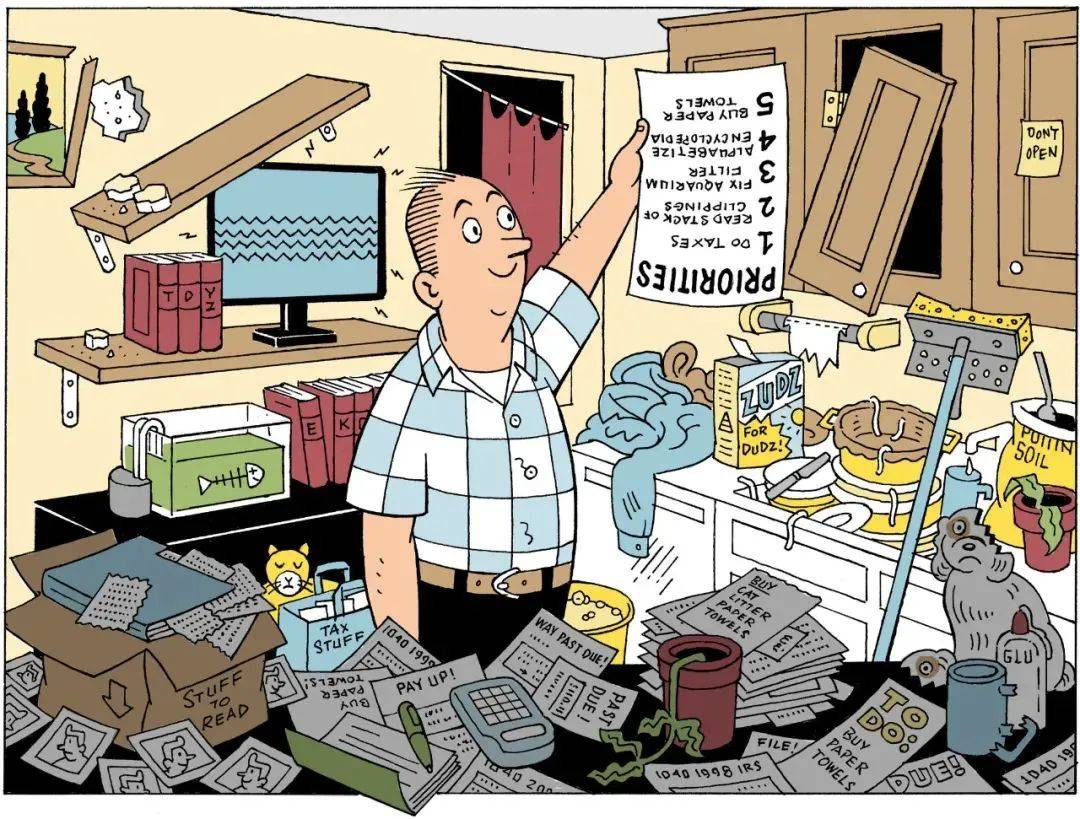Deadline是第一生产力?怎么才能摆脱拖延症?
拖延症不是时间管理问题,是情绪管理问题。

今天的双语短文Assignment代写带大家了解拖延症,解决拖延症。
Ways to Overcome Procrastination
克服拖延症的方法

认识拖延症
Procrastination is not a time management problem; rather, it’s likely due to difficulty managing negative feelings like boredom or anxiety.
拖延症不是时间管理的问题;相反,这可能是因为难以管理无聊或焦虑等消极情绪才导致的。
But avoiding negative emotions—and important tasks—tends to lead to much worse outcomes in the long run, including more stress and regret.
但是从长远来看,避免消极情绪和重要任务往往会导致更糟糕的结果,包括更多的压力和遗憾。
Changing your mindset, rewarding yourself for progress, and letting go of perfectionism can all help you overcome procrastinating tendencies.
改变心态,奖励自己的进步,放弃完美主义,这些都能帮助你克服拖延倾向。
In order to be on top of our game both personally and organizationally, we need to develop a growth mindset.
为了在个人和组织上都处于领先地位,我们需要培养一种成长心态。

Why procrastination?
为什么会拖延?
Everyone has put off a task at some point in their life. While some view it (in themselves or other people) as laziness, there might be something else at play.
每个人都会在人生的某个时刻推迟一项任务。虽然有些人认为(他们自己或别人)是懒惰,但可能另有原因在起作用。
In psychology, it has long been believed that people who procrastinate have a faulty sense of time—that they think they will have more time to get something done than they actually do. While that may be true for some, more recent research suggests procrastination is linked to difficulty managing distress.
在心理学上,人们一直认为拖延症患者的时间感知能力是错误的,有拖延症的人认为自己会有更多的时间来完成某件事,而实际上他们并没有。虽然这对一些人来说可能是真的,但最近的研究表明,拖延症与难以管理压力有关。
Specifically, it seems that task aversion is to blame—that is, when people view a task in an unpleasant manner (“It will be tough, boring, painful…”), they are more likely to put it off.
具体来说,拖延症的原因是因为人们厌恶这项工。也就是说,当人们以一种不愉快的方式看待一项任务(“它会很艰难、无聊、痛苦……”)时,他们更有可能推迟它。
While procrastinators may be trying to avoid distress, this approach can ironically cause more distress in the long run. Procrastination can lead to increased stress, health problems, and poorer performance. Procrastinators tend to have more sleep issues and experience greater stressful regret than non-procrastinators. What’s more, procrastination can also hinder your self-esteem with the guilt, shame, or self-critical thoughts that can result from putting off tasks.
虽然拖延者可能试图避免痛苦,但具有讽刺意味的是,从长远来看,这种方法会导致更多的痛苦。拖延症会导致压力增加、健康问题和表现不佳。与非拖延者相比,拖延者往往有更多的睡眠问题,经历更大的压力和遗憾。更重要的是,拖延还会因拖延任务而产生的负罪感、羞耻感或自我批评思想阻碍你的自尊。

Solutions are here
7个方法摆脱拖延症
If you struggle with putting things off, try any of these tips to get you on track:
如果你还在为拖延而挣扎,试试下面的任何一个建议,他们能让你的学习工作回到正轨:
1. Get out your calendar
码住时间
Projects that will get done “when I have time” (as in “I will do it when I have time”) tend not to get done very often, if ever. You need to schedule when you are going to work on a project and block out that time, just as you would an important meeting. And when it is time to do your work, set a timer so you can be focused for the entire allotted time.
那些“只要我有时间”就会完成的项目(比如“我一有时间就会去做”)往往不会被完成。你需要安排好你什么时候要做一个项目,并划出时间,就像你要开一个重要的会议一样。当你要做工作的时候,设置一个计时器,这样你就可以在指定的时间内集中精力。
2. Be realistic
现实一点
As you establish your schedule, set yourself up for success. Projects often take much longer than expected, so bake in some extra time. And look for ways to make it easier on yourself: If, for example, you are not a morning person, don’t expect yourself to get up an hour early to start the exercise program you have put off for months. It might be better to schedule that activity during lunch or before dinner.
当你制定你的时间表时,要考虑你能否成功地实施。项目通常会花费比预期更长的时间,所以要准备一些额外的时间。如果你不是早起的人,那就别指望自己提前一个小时起床去做哪些已经被拖延了好几个月的锻炼。把时间规划在午餐时间或晚餐前会比较现实。
3. Chunk it
切割任务
When a task seems overbearing, procrastination often follows. So how can you break that task into smaller, more manageable parts? For example, if you want to write a book, you may choose to make an outline, identify each chapter, figure out the sections in the chapters, and then commit to writing one segment at a time. Chunking it down like this will help you feel less overwhelmed and more empowered.
当一项任务复杂庞大的时候,拖延症往往随之而来。那么,如何将任务分解成更小、更容易完成的部分呢?例如,如果你想写一本书,你可以选择做一个大纲,确定每个章节,找出每个章节的内容,然后一次写一个章节。像这样把事情分成几部分,会让你感觉更轻松,更有力量。
4. Excuses be gone
不找借口
Do any of these sound familiar? “I need to be in the mood.” “I will wait until I have time.” “I work better under pressure.” “I need X to happen before I can start.”
Stop it!
Be honest with yourself: These are excuses. Sure, it might be nice to “be in the mood,” but waiting for that to happen can mean you never start your project.
我们常听人们说——“我需要有心情”,“我要等到我有时间”,“我在压力下工作得更好”,“我需要啥啥啥才能开始做事儿”。
别再自欺欺人了!
对自己诚实点:这些都是借口。当然,“有心情”是件好事,但等待它发生可能意味着你永远不会开始你的工作。

5. Get a partner
找个伴儿
Establish specific deadlines for completing a task. Then find someone who will help you be accountable. It could be a promise to your boss or client that you will complete the job by a certain date. Or it may be a coach who helps you stay on track. Or simply find an accountability partner.
为完成一项任务设定具体的期限。然后找一个可以督促你的人。你可以和你的老板或客户承诺你能在某个日期完成工作。或者你可以找一个教练帮助你保持在正轨上。你还可以直接找个负责任的伙伴。
In this relationship, you connect with someone (on the phone, for example) at certain time intervals (such as once per week) and commit to what you will do before your next meeting. Not wanting to go back on your word, this can be a great way to squash procrastination. (Note: In an effort to save your relationship with your significant other, I recommend this person not be your partner. You don’t want a lack of follow-through to cause tension between you.
在这段关系中,你每隔一段时间(比如每周一次)和某人联系(比如打电话),并承诺下次见面前要做什么。不想反悔,这是一种压制拖延症的好方法。(注意:为了挽救你们之间的关系,我建议这个人最好别是你的爱人。你也不希望因为缺乏后续行动而导致你们之间的紧张关系吧。)
6. Optimize your environment
优化环境
Your environment can help or hinder your productivity. Beware especially of technology, such as your email or messenger that keeps pinging to let you know someone has reached out. Social media, internet “research” that leads you far off track, and phone calls can lead to procrastination. So, just don’t let yourself get on the web until you have completed the task, or hold off any necessary internet searches until the end.
你的环境可以帮助或阻碍你的工作效率。要特别注意科技产品,比如你的电子邮件或短信,它会不断提醒你有人联系了你。社交媒体、互联网上的“研究”会让你偏离正轨,电话也会导致拖延症。所以,在你完成任务之前,别上网,或者把需要上完才能完成的工作推到最后再做。
7. Reward good behavior
给自己正向奖励
Establish a reward if—and only if—you do what you set out to do. Do not let yourself binge that new Netflix show, check your social media, or get lunch until you complete what you’ve scheduled. So instead of using these tasks and distractions to procrastinate, make them contingent on you actually finishing what you schedule yourself to do.
只在完成了任务之后,才给自己奖励。在完成你的计划之前,不要让自己沉迷于新的电视剧,也别查看你的社交媒体,或吃午饭。所以,与其利用这些任务和干扰来拖延,不如让它们来激励自己做事,成为做完任务之后的奖励。
